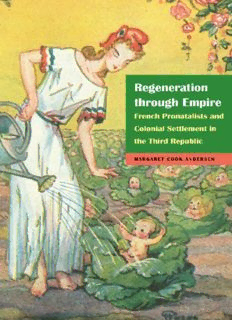
Regeneration through Empire: French Pronatalists and Colonial Settlement in the Third Republic PDF
Preview Regeneration through Empire: French Pronatalists and Colonial Settlement in the Third Republic
Regeneration through Empire France Overseas: Studies in Empire and Decolonization Series editors: A. J. B. Johnston, James D. Le Sueur, and Tyler Stovall R EGENER ATION THROUGH EMPIR E French Pronatalists and Colonial Settlement in the Third Republic Margaret Cook Andersen University of Nebraska Press Lincoln & London © 2015 by the Board of Regents of the University of Nebraska A version of chapter 3 was originally published as “Creating French Settlements Overseas: Colonial Medicine and Familial Reform in Madagascar,” by Margaret Cook Andersen, in French Historical Studies 33, no. 3 (Summer 2010): 417– 44. A version of chapter 4 was originally published as “French Settlers, Familial Suffrage, and Citizenship in 1920s Tunisia,” by Margaret Cook Andersen, in Journal of Family History 37, no. 2 (April 2012): 213– 31. All rights reserved Manufactured in the United States of America Library of Congress Control Number: 2014952326 Set in Minion Pro by Renni Johnson. To Brett, Katie, and Lexie contents List of Illustrations viii Acknowledgments ix Introduction 1 1. France’s “Supreme Chance”: Migration and Pronatalist Visions of Empire 25 2. Recruiting Colonial Settlers: The Union Coloniale Française and the Non- Classées 61 3. Creating a “Labor Reservoir”: Pronatalism, Medicine, and Motherhood in Madagascar 110 4. Voting for the Family: The Fight for Familial Suffrage in France and North Africa 159 5. A Colonial Fountain of Youth: Family Rights, Pronatalism, and Settler Politics in North Africa 200 Conclusion 237 Notes 251 Bibliography 291 Index 317 illustrations Figures 1. “Le péril jaune,” 1928 13 2. Fête des enfants in Madagascar, 1904 137 Tables 1. Population by age in Madagascar and France, 1900 150 2. Numbers of births over deaths in the province of Itasy, 1901– 1904 151 3. Numbers of votes in three electoral systems 171 acknowledgments Since I began researching this book a decade ago, many people and institutions have helped me along the way with their generous intel- lectual, financial, and emotional support. In these pages I can only begin to acknowledge my appreciation for everything they have done to help make this book possible. Funding from a variety of sources was indispensable. A Florence Gould pre- dissertation grant from the Council for European Stud- ies and numerous grants and fellowships from the University of Iowa funded the first years of research. At the University of Tennessee, a Professional Development Award and a semester of junior faculty leave helped me move forward with my research and writing. Finally, a summer stipend from the National Endowment for the Humani- ties enabled me to undertake the final research and prepare the man- uscript for publication. My initial curiosity in French history was sparked at Occidental Col- lege, where I was privileged to have dedicated professors who believed in me and inspired me during my undergraduate years. In particular, I would like to thank Nina Gelbart and Annabelle Rea for supporting my decision to pursue graduate school and encouraging me to study abroad. In addition to being one of the most meaningful experiences of my life, my junior year in Rennes and Toulouse sparked my inter- est in the politics and culture of the Third Republic. The University of Iowa provided a collegial environment that facil- itated my early work on this project. In the first years of my graduate
Description: